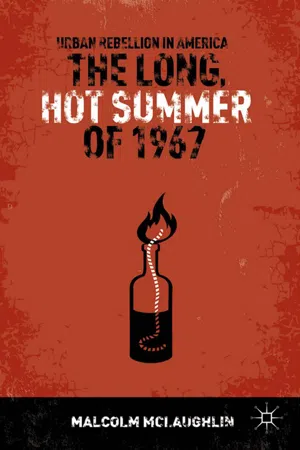![]()
NOTES
Preface
1. Public Papers of the President of the United States (Washington, DC: GPO, 1968), 721–724. For Cavanagh, “The Fire This Time,” Time, 90:5 (1967), 13.
2. Public Papers (1968), 715–717. Ramsey Clark Oral History Interview IV, April 16, 1969 (Harri Baker), 4–5 (pdf, LBJ Library). For police, Hubert G. Locke, The Detroit Riot of 1967 (Detroit, MI: Wayne State UP, 1967), 30–31. For deployment of troops, Joseph A. Califano, The Triumph and Tragedy of Lyndon Johnson: The White House Years (New York: Simon & Schuster, 1991), 214–218; Harry McPherson, A Political Education: A Washington Memoir (Austin, TX: U Texas P, 1995 (originally 1972)), 359–360; Sidney Fine, Violence in the Model City: The Cavanagh Administration, Race Relations, and the Detroit Riot of 1967 (East Lansing, MI: Michigan State UP, 2007 (originally 1989)), 203–209; David C. Carter, The Music Has Gone Out of the Movement: Civil Rights and the Johnson Administration, 1965–1968 (Chapel Hill, NC: U North Carolina P, 2009), 204–208.
3. For 1964 summary, Thomas J. Sugrue, Sweet Land of Liberty: The Forgotten Struggle for Civil Rights in the North (New York: Random House, 2008), 324–325. Watts, Gerald Horne, Fire This Time: The Watts Uprising and the 1960s (New York: Da Capo Press, 1995); Robert Conot, Rivers of Blood, Years of Darkness (New York: Bantam Books, 1967). 1964–1967 overview: Kerner Report, 19–21.
4. Robert Dallek, Flawed Giant: Lyndon Johnson and His Times, 1961–1973 (Oxford and New York: OUP, 1998); Irving Bernstein, Guns or Butter: The Presidency of Lyndon Johnson (Oxford and New York: OUP, 1996); Ira Katznelson, “Was the Great Society a Lost Opportunity?” in Steve Fraser and Gary Gerstle (eds), The Rise and Fall of the New Deal Order, 1930–1980 (Princeton, NJ: Princeton UP, 1989), 185–211. Irwin Unger, The Best of Intentions: The Triumph and Failure of the Great Society Under Kennedy, Johnson, and Nixon (New York: Doubleday, 1996).
5. Jacqueline Dowd Hall, “The Long Civil Rights Movement and the Political Uses of the Past,” Journal of American History, 91:4 (2005), 1233–1263; 1233–1234.
6. Suzanne E. Smith, Dancing in the Street: Motown and the Cultural Politics of Detroit (Cambridge, MA: Harvard UP, 1999). “Rush Limbaugh Attacks Detroit, But He Should Really Get His Facts Straight,” Huffington Post, August 2, 2013 (http://www.huffingtonpost.com, August 12, 2013).
7. Fred R. Harris, Alarms and Hopes: A Personal Journey, a Personal View (New York: Harper & Row, 1968).
Introduction Long, Hot Summers
1. Clark Interview II, February 11, 1969 (Harri Baker), 13. Referring to the same interview, Kenneth O’Reilly noted “Few people in the White House, the Department of Justice, or the FBI for that matter expected the ‘racial problem’ to jump the Mason-Dixon Line.” Kenneth O’Reilly, Racial Matters: The FBI’s Secret File on Black America, 1960–1972 (New York: Free Press, 1989), 231. See also transcript, Harry McPherson Oral History Interview V, April 9, 1969 (T. H. Baker), 1–2 (pdf, LBJ Library).
2. Letter to Editor, Mary St. John Villard, New York Times, June 17, 1964 (pdf).
3. “Violence Sends a Message,” Ebony, 19:11 (1964), 140.
4. Thomas J. Sugrue, Sweet Land of Liberty: The Forgotten Struggle for Civil Rights in the North (New York: Random House, 2008), 159.
5. For example, Gerald Horne, Fire This Time: The Watts Uprising and the 1960s (Cambridge, MA: Da Capo, 1995), 28–30.
6. McPherson Interview V, 2.
7. “King Forecasts ‘Long, Hot Summer,’” St. Petersburg Times, May 27, 1964, 11-B (http://www.news.google.com/archivesearch, August 26, 2013).
8. John R. Rachal, “‘The Long, Hot Summer’: The Mississippi Response to Freedom Summer, 1964,” Journal of Negro History, 84:4 (1999), 315–339, 324.
9. Kerner Report, 116, 118–19, 121.
10. “Lomax Predicts ...
